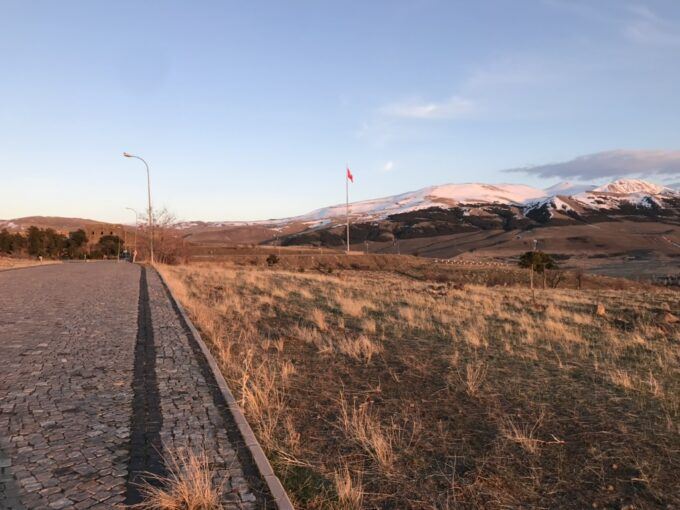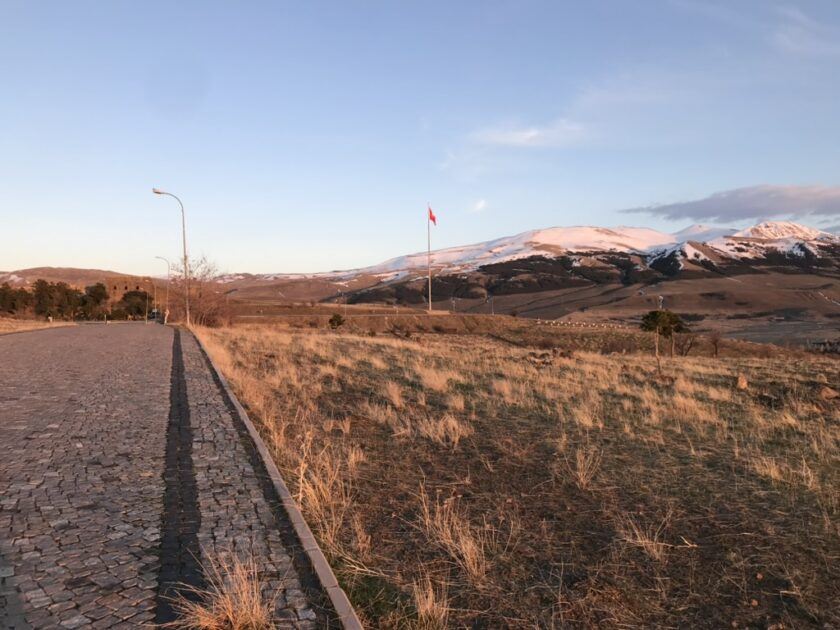





























































This is the sixteenth part in a series about riding night trains across Europe and the Near East to Armenia—to spend time in worlds beyond the pathological obsessions of Donald Trump. (This week, Trump continued his shakedown of the Ivy League—notably Harvard and Columbia—claiming that receipt of federal grants gives Trump the right to oversee university curricula and hiring practices, even though the only major offered at the now-defunct Trump University was Bankruptcy Science.)

A rampart outside the strategic city of Erzurum in eastern Turkey, where John Buchan set the conclusion to his Great Game thriller Greenmantle, which I can recommend to anyone needing a break from Trump’s onanism. Photo: Matthew Stevenson.
The next morning, which was clear, cool, and sunny, I was out of my hotel at 7:45 a.m. and, when it opened at 8:00 a.m., in the lobby of the museum dedicated to the Erzurum Congress in July-August 1919. It was there that Atatürk resigned his army commission and stated the goals of an independent Turkish republic, which would reshape the politics of the Middle East, if not the world, for the next 100 years.
I realize Erzurum must sound like the end of the earth, and in many senses it is (an overnight train ride east from Ankara), except it can argued that battles fought here in these mountains decided not just the 1853-56 Crimean war and 1877 was between Turkey and Russia, but also determined the outcome in the East during World War I.
The hall looks like a high school classroom, with rows of desks for the delegates, and the surrounding storyboards describe the conclusions reached during the Congress.
Off to the side of the Congress hall are the conference rooms where Atatürk met with other delegates, and on the walls around the museum are pictures of Atatürk in a topcoat and tails, carrying a walking stick and white gloves. (He was certainly the best-dressed nationalist revolutionary in history.)
From the Erzurum Congress came the organized Turkish opposition both to the failing Ottoman government and the leadership of Atatürk at the head the independence movement. It followed the Greek invasion in western Anatolia and the postwar western partition of the Ottoman Empire (drafted at Mudros in 1918 and ratified in the Treaty of Sèvres, although that wasn’t signed until August 1920).
+++
From the Congress hall, I biked across Erzurum, which by now was familiar, and went to the house where Atatürk stayed during the 1919 meetings.
Under the Ottomans, the house had been the governor’s mansion, but as Atatürk’s lodging during the Congress it has since become the Turkish equivalent of a “George Washington Slept Here” revolutionary war house.
On the walls were maps of the Turkish insurrection against the foreign occupation, and in a few rooms were wax figures of Atatürk conferring with his delegates and military staff, all of whom had come to swear their allegiance to Mustafa Kemal.
One of the framed exhibits includes the words spoken to Atatürk by the local military commander in the region, Kâzim Karabekir Paşa, who said:
I came here to express the respect and honor of all the officers and of the enlisted men under my command. You, from now on as was before, are our respectable commander. I brought the car of the corps commander and a cavalry troop to escort you. Paşa, we are all at your service.
It was the only mandate that Atatürk needed to take command in the war of independence, and since 1919 Turkey hasn’t shown much concern for democracy.
+++
At Erzurum Castle, two men in the ticket kiosk happily agreed to keep an eye on my bicycle while I walked the ramparts and climbed to the top of the watchtower from which there were panoramic views in all directions of the hills surrounding Erzurum.
From that perch it was easy to see why Erzurum was the strategic chokepoint in eastern Turkey, and the key to any military campaign in the region.
Before 1877, there were numerous battles for Erzurum between the Ottomans and either the Russians or Persians. After 1877 (which ended with the Russians withdrawing to Kars), there was a climactic battle at Erzurum between the Russians and the Ottomans in winter 1916, when the landscape and surrounding mountains were buried in snow.
The Russians captured Erzurum (it’s a forgotten battle in World War I), which had the effect of stopping the Turkish offensive in Sinai against the Suez Canal. Had Erzurum not fallen, the Turks might well have driven Russia from the war in 1916.
+++
Standing on the parapet and looking around at the surrounding snow-capped mountains, I remembered that the John Buchan novel, Greenmantle, ended with the Russian capture of Erzurum, in part thanks to the heroics of British spies Richard Hannay and Sandy Arbuthnot, who managed to steal from the Germans the defensive plans for the fortress city.
Buchan writes:
But my eyes were on the north. From Erzerum [as Buchan spells it] city tall tongues of flame leaped from a dozen quarters. Beyond, towards the opening of the Euphrates glen, there was the sharp crack of field-guns. I strained eyes and ears, mad with impatience, and I read the riddle.
“Sandy,” I yelled, “Peter has got through. The Russians are round the flank. The town is burning. Glory to God, we’ve won, we’ve won!”
Hannay and Arbuthnot went undercover into the Ottoman Empire to thwart German plans (the Ottomans were allied to the Central Powers) to foment rebellion in Muslim lands against their British colonial overlords. (In raising the alarm Buchan writes: “There is a dry wind blowing through the East, and the parched grasses wait the spark. And that wind is blowing towards the Indian border.”) The victory at Erzurum put out the flames, at least for the balance of 1916.
The Buchan novel ends with Arbuthnot disguised as the German agent “Greenmantle” (who was himself killed earlier in the battle) entering Erzurum, as if on a Trojan horse. Buchan writes:
But as we drew out from the skirts of the hills and began the long slope to the city, I woke to clear consciousness. I felt the smell of sheepskin and lathered horses, and above all the bitter smell of fire. Down in the trough lay Erzerum, now burning in many places, and from the east, past the silent forts, horsemen were closing in on it. I yelled to my comrades that we were nearest, that we would be first in the city, and they nodded happily and shouted their strange war-cries. As we topped the last ridge I saw below me the van of our charge—a dark mass on the snow—while the broken enemy on both sides were flinging away their arms and scattering in the fields.
In the very front, now nearing the city ramparts, was one man. He was like the point of the steel spear soon to be driven home. In the clear morning air I could see that he did not wear the uniform of the invaders. He was turbaned and rode like one possessed, and against the snow I caught the dark sheen of emerald. As he rode it seemed that the fleeing Turks were stricken still, and sank by the roadside with eyes strained after his unheeding figure …
Then I knew that the prophecy had been true, and that their prophet had not failed them. The long-looked for revelation had come. Greenmantle had appeared at last to an awaiting people.
But this “Greenmantle” was a member of his majesty’s secret service, who was doing his best to make the eastern world safe for colonialism. I know it will sound far-fetched to say, but there’s a direct line in those mountains and then in the sand from Erzurum in 1916 to Gaza today.
The post Greenmantle Saves the British Empire appeared first on CounterPunch.org.
This content originally appeared on CounterPunch.org and was authored by Matthew Stevenson.